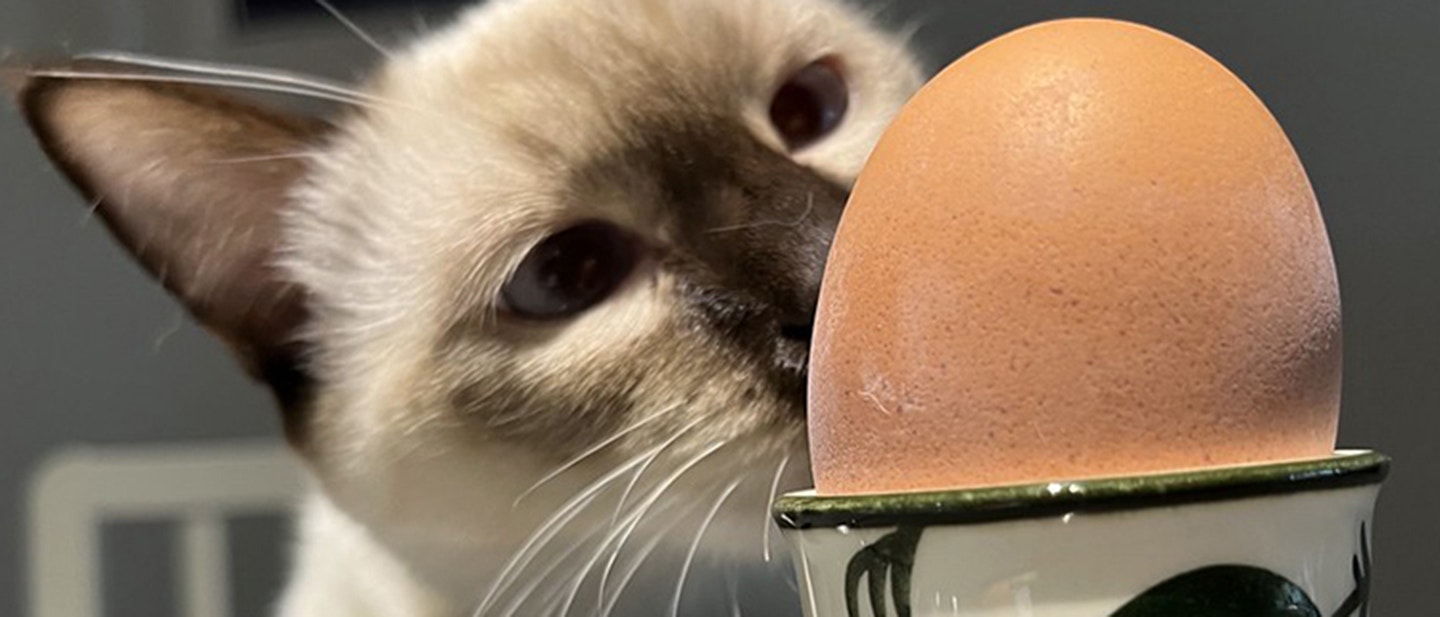
CAN CATS EAT EGGS? A GUIDE TO FELINE NUTRITION AND DIETARY SAFETY

Article checked by a vet
As pet food experts, we often get asked questions like “can cats eat eggs?”, “can cats eat egg yolk?” and “can cats eat cooked eggs?”.
The short answer to this is yes, in moderation. Cats can eat egg yolk and whites, and provided they’re cooked and in small quantities, eggs can be a reasonably nutritious occasional treat as part of your cat’s diet.
In this guide, we’ll take a closer look at whether cats can eat eggs safely, and how this can affect their long-term health.
Before we think about the question “can cats eat eggs?” we should consider whether or not they should eat eggs.
It’s important to note that a whole egg contains around 80 calories, and according to The All Feline Hospital(open in new tab), an adult cat only needs 200-300 calories per day to maintain a healthy diet. With this in mind, you should be very cautious with portion control, and avoid giving your cat a whole egg in any one sitting.
With this in mind, they should only be given as an occasional treat in very small portions, rather than a regular staple of their diet.
Like with adult cats, eggs should never be a kitten’s primary source of protein. To ensure your kitten is getting all the nutrition they need to grow at a healthy rate, be sure to feed them consistent meals with nutritionally-balanced kitten food, like Perfect Fit™ Junior cat food.
If you do decide to give eggs to your cat, we strongly recommend cooking them thoroughly to avoid the risk of your pet coming into contact with harmful bacteria.
While cats can eat raw eggs, and many will certainly try if they get the chance, this should always be avoided in the interest of their health.
However, with a high concentration of fat and protein, cooked eggs can be a great way to ensure they’re getting key nutrients in their diet.
Like humans, raw eggs can give cats food poisoning and bacterial infections. Raw eggs also contain avidin, an enzyme that can interfere with a cat’s ability to absorb key vitamins. For these reasons, it’s important to make sure eggs are thoroughly cooked and served in small amounts whenever you’re giving them to your cat. Cats can eat scrambled eggs easily due to the softened texture, but there’s no major difference to how it will affect their nutritional health in terms of the way you cook them.
As cats can eat egg yolk and whites without issue, there’s no need to be overly cautious about separating the two.
When you’re giving scrambled egg to your cat, we recommend cooking it for longer than you might for a human, and avoid making them overly runny.
While cats can eat raw eggs when given to them, this should be avoided to reduce the risk of bacterial infections. You should also avoid adding any extra ingredients you might put in your own eggs, for example, salt and garlic. While non-fussy cats can eat scrambled eggs with all your favourite trimmings, these could be harmful, and probably won’t make the eggs any tastier for them anyway!
When considering the question “can cats eat eggs?”, we should remember that cats have much lower caloric requirements compared to humans, and it’s important to bear this in mind when you’re portioning up eggs to add to your cat’s food. An average 10-pound indoor cat only needs around 200 calories per day, a target amount that increases to a maximum of 300 if you have a particularly large indoor cat or an active outdoor cat. Other factors could affect the ideal portion size for your cat, so it’s best to consult a veterinarian for their advice.
While many cats can eat boiled eggs easily, remember that just one is roughly equivalent to eight eggs for humans. It’s recommended that you never serve more than half a small portion of a single egg to your cat in one sitting, that eggs are thoroughly cooked, and that they don’t become a part of their daily diet.
Excessive egg consumption can make your cat feel sick after eating, and can lead to obesity in the long term. For normal-sized cats, serving a tablespoon of cooked egg white is an ample amount to supplement the protein in their diet without overfeeding them.
Can cats eat eggs with an upset tummy?
High in protein and nutrients, but low in fermentable carbohydrates, cats can eat cooked eggs as a good way to control gastrointestinal issues like vomiting and diarrhoea.
Diarrhoea in cats can be caused by a lot of things, including eggs and other foodstuffs. If your cat seems to have an upset tummy after eating eggs, this could also be caused by seasoning and other additives, a common issue seen with cat parents who feed their pets directly from their plate.
It’s recommended that you consult your vet before introducing any kind of new food to your cat’s diet, especially if they’re prone to gastrointestinal issues.
Some common food allergy symptoms to be aware of include:
- Hair loss and patchy fur.
- Overgrooming in cats.
- Vomiting, diarrhoea, and other signs of gastrointestinal upset.
- Excessive scratching.
- Inflamed inner ears.
If you’re planning to introduce eggs to your cat’s diet, it’s important to do this gradually alongside their normal food, and to keep a close eye on any physical reactions after eating. If you notice any of the allergy symptoms listed above, it’s important that you book a consultation with your veterinary and seek their advice as soon as possible.
Wrapping up
While eggs can be a tasty and nutritious addition to your cat’s diet, it’s important to remember there’s no single answer to the question “can cats eat eggs?” Always approach feeding your cat eggs with caution, serve it cooked and in moderation, as an occasional treat, and always seek the advice of a veterinarian if you’re unsure of anything.
For more help with giving your cat a healthy, balanced diet, be sure to check out our comprehensive guide on optimal nutrition for cat's immune system, and our range of nutritionally complete Perfect Fit™ Cat food.
